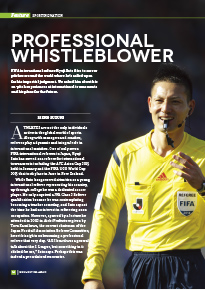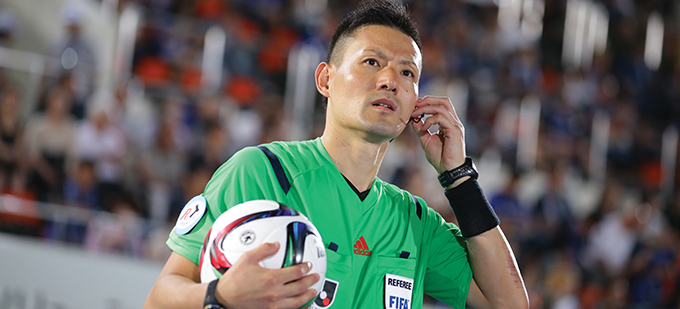Home > Highlighting JAPAN >Highlighting Japan October 2015>Sporting Nation
Highlighting JAPAN

Sporting Nation
Professional Whistleblower
FIFA international referee Ryuji Sato flies to soccer pitches around the world where he’s relied upon for his impartial judgment. We asked him about his on-pitch experiences at international tournaments and his plans for the future.

Athletes are not the only individuals active in the global world of sports. Along with managers and coaches, referees play a dynamic and integral role in international matches. One of only seven FIFA international referees in Japan, Ryuji Sato has served as a referee for international tournaments including the AFC Asian Cup 2015 held in January and the FIFA U-20 World Cup 2015 that took place in June in New Zealand.
While Sato has garnered attention as a young international referee representing his country, up through college he was a dedicated soccer player. He only acquired a JFA Class 2 Referee qualification because he was contemplating becoming a teacher someday, and Sato says at the time he had no interest in refereeing as an occupation. However, spurred by a lecture he attended in 2002 in Aichi Prefecture given by Toru Kamikawa, the current chairman of the Japan Football Association Referee Committee, he set his sights on becoming a professional referee that very day. “All I heard was a general talk about the J. League, but something in it clicked for me,” Sato says. Perhaps this was indeed a preordained encounter.
Sato acquired his JFA Class 1 referee qualifications in December 2004, and in March 2005 began his career as a Class 1 referee in the JFL, the top amateur league underneath J. League (Japan’s professional league). He then built up experience in J. League’s J2 and J1 divisions, and in 2009 became a FIFA international referee.
“My debut in an international A match as an international referee came in March 2009, in a friendly between South Korea and Iraq,” Sato recalls. “Although it was a friendly match, it was the year before the 2010 World Cup, so the players, managers and supporters were all very intense. Until then, I thought I’d built up enough experience in the J. League. Once the national anthems were being played, though, I realized this was what it meant to be on the world stage, and I got really nervous about blowing my first whistle there. At the same time, when the match was over, I felt a sense of fulfillment, and I really wanted to be able to blow the whistle at an international match on the World Cup level someday.”
Of course, being an international referee has presented some difficult moments as well. The match that left the most lasting impression occurred during the second round of the 2014 FIFA World Cup Asian qualifying tournament.
“Objects were being thrown from the stands on the trailing team’s side, and the match was suspended temporarily,” Sato explains. “Ultimately it took two hours to announce the cancellation of the match. I was the referee who had the authority to discontinue the match, and although I understood that there was no way to continue, I wavered under the pressure of abandoning an official match. I acutely realized then that I could not be recognized as an international referee if I did not have the ability to make an impartial decision and see it through with determination.”
Each FIFA international referee’s registration is renewed yearly after receiving FIFA approval based on recommendations from the Japan Football Association, including evaluation of the referee’s game control, refereeing, and other factors throughout the year. Unless a referee performs at his best in all matches, it becomes difficult to remain an international referee. In addition, to officiate overseas matches in proper physical condition, international referees must quickly adapt to environments that vary greatly from those in Japan, particularly the weather and the time zone. This is obviously a remarkable job that requires both mental and physical toughness.
“My objective is to become a referee that players from all over the world will trust to make impartial and fair judgments, and feel that ‘the call is fair, because it’s his job,’ ” Sato states. “By gaining experience, and making as much as I can of each and every game, I plan on improving myself through every match.” Pushed by his ambition, Ryuji Sato continues to grow as an international referee while experiencing soccer culture around the world. The day we hear his whistle across the global stage of the World Cup may come soon.
© 2009 Cabinet Office, Government of Japan






